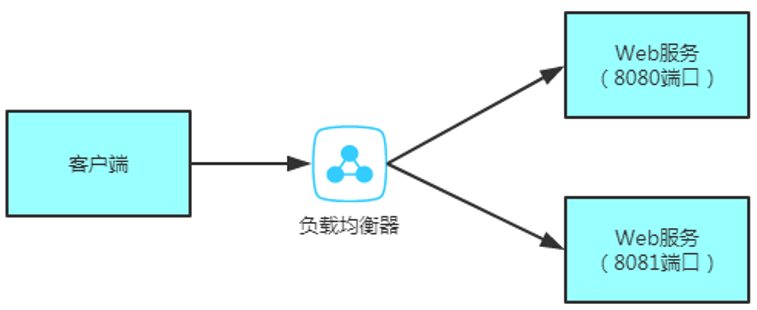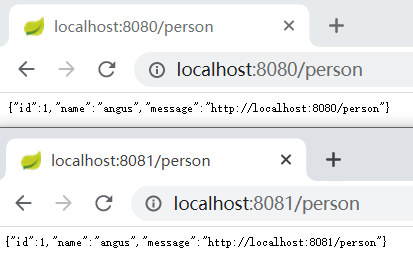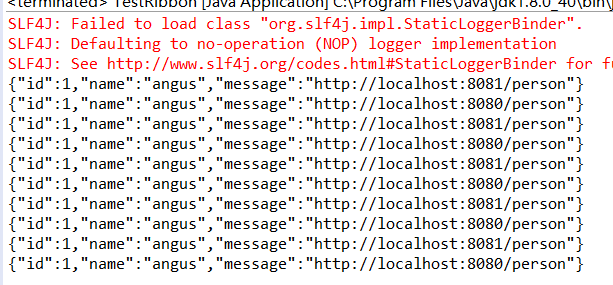1. Ribbon
负载均衡框架,支持可插拔式的负载均衡规则
支持多种协议,如HTTP、UDP等
提供负载均衡客户端
1.1 负载均衡器组件
一个负载均衡器,至少提供以下功能:
- 要维护各个服务器的IP等信息
- 根据特定逻辑选取服务器
为了实现基本的负载均衡功能,Ribbon的负载均衡器有三大子模块:
- Rule
- Ping
- ServerList

1.2 实现程序
创建项目:ribbon-service
pom.
<project xsi:schemaLocation="http://maven.apache.org/POM/4.0.0 <modelVersion>4.0.0</modelVersion> <groupId>org.crazyit.cloud</groupId> <artifactId>ribbon-service</artifactId> <version>0.0.1-SNAPSHOT</version> <dependencies> <dependency> <groupId>org.springframework.boot</groupId> <artifactId>spring-boot-starter-web</artifactId> <version>1.5.7.RELEASE</version> </dependency> </dependencies> </project>
Person:
package org.crazyit.cloud;public class Person { private Integer id; private String name; private String message; public Integer getId() { return id; } public void setId(Integer id) { this.id = id; } public String getName() { return name; } public void setName(String name) { this.name = name; } public String getMessage() { return message; } public void setMessage(String message) { this.message = message; } }MyController:
package org.crazyit.cloud;import javax.servlet.http.HttpServletRequest;import org.springframework.http.MediaType;import org.springframework.web.bind.annotation.RequestMapping;import org.springframework.web.bind.annotation.RequestMethod;import org.springframework.web.bind.annotation.RestController;@RestControllerpublic class MyController { @RequestMapping(value = "/person", method = RequestMethod.GET, produces = MediaType.APPLICATION_JSON_VALUE) public Person getPerson(HttpServletRequest request) { Person p = new Person(); p.setId(1); p.setName("angus"); p.setMessage(request.getRequestURL().toString()); return p; }}ServiceApp:
package org.crazyit.cloud;import java.util.Scanner;import org.springframework.boot.autoconfigure.SpringBootApplication;import org.springframework.boot.builder.SpringApplicationBuilder;@SpringBootApplicationpublic class ServiceApp { public static void main(String[] args) throws Exception { Scanner scan = new Scanner(System.in); String port = scan.nextLine(); new SpringApplicationBuilder(ServiceApp.class).properties( "server.port=" + port).run(args); }}启动两个服务:控制台输入8080和8081:

然后创建一个客户端ribbon-client项目:
pom:
<project xsi:schemaLocation="http://maven.apache.org/POM/4.0.0 <modelVersion>4.0.0</modelVersion> <groupId>org.crazyit.cloud</groupId> <artifactId>ribbon-client</artifactId> <version>0.0.1-SNAPSHOT</version> <dependencies> <dependency> <groupId>com.netflix.ribbon</groupId> <artifactId>ribbon-core</artifactId> <version>2.2.2</version> </dependency> <dependency> <groupId>com.netflix.ribbon</groupId> <artifactId>ribbon-httpclient</artifactId> <version>2.2.2</version> </dependency> </dependencies></project>
TestRibbon:
package org.crazyit.cloud;import com.netflix.client.ClientFactory;import com.netflix.client.http.HttpRequest;import com.netflix.client.http.HttpResponse;import com.netflix.config.ConfigurationManager;import com.netflix.niws.client.http.RestClient;public class TestRibbon { public static void main(String[] args) throws Exception { ConfigurationManager.getConfigInstance().setProperty( "my-client.ribbon.listOfServers", "localhost:8080,localhost:8081"); RestClient client = (RestClient) ClientFactory.getNamedClient("my-client"); HttpRequest request = HttpRequest.newBuilder().uri("/person").build(); for(int i = 0; i < 10; i++) { HttpResponse response = client.executeWithLoadBalancer(request); String json = response.getEntity(String.class); System.out.println(json); } }}然后运行:

实现了负载均衡了。
原文转载:http://www.shaoqun.com/a/485810.html
shirley:https://www.ikjzd.com/w/1684
跨境通网站:https://www.ikjzd.com/w/1329
大森林:https://www.ikjzd.com/w/2268
1.Ribbon负载均衡框架,支持可插拔式的负载均衡规则支持多种协议,如HTTP、UDP等提供负载均衡客户端1.1负载均衡器组件一个负载均衡器,至少提供以下功能:要维护各个服务器的IP等信息根据特定逻辑选取服务器为了实现基本的负载均衡功能,Ribbon的负载均衡器有三大子模块:RulePingServerList1.2实现程序创建项目:ribbon-servicepom.<projectxs
乐宝:https://www.ikjzd.com/w/2200
amazon go:https://www.ikjzd.com/w/67
影响亚马逊产品排名的23个因素:https://www.ikjzd.com/home/122773
深圳西冲旅游住哪好?深圳西冲客栈有哪些?:http://tour.shaoqun.com/a/127.html
你还在发自嗨式的开发信吗?:https://www.ikjzd.com/home/132126
No comments:
Post a Comment